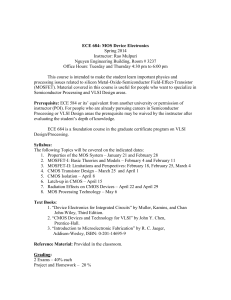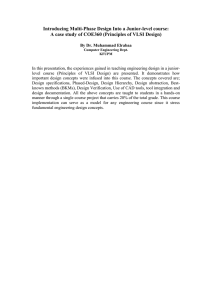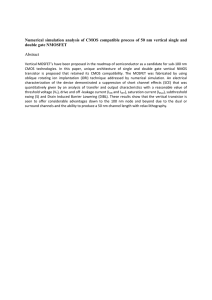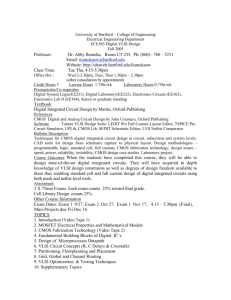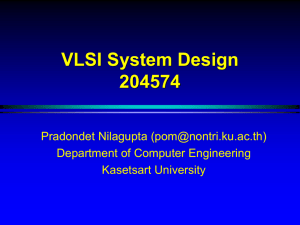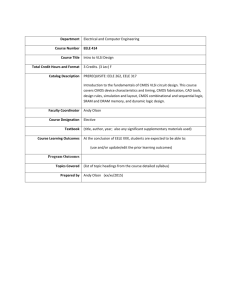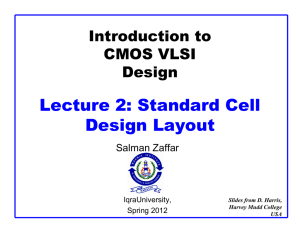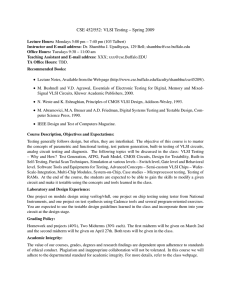Motherboard PCB
advertisement
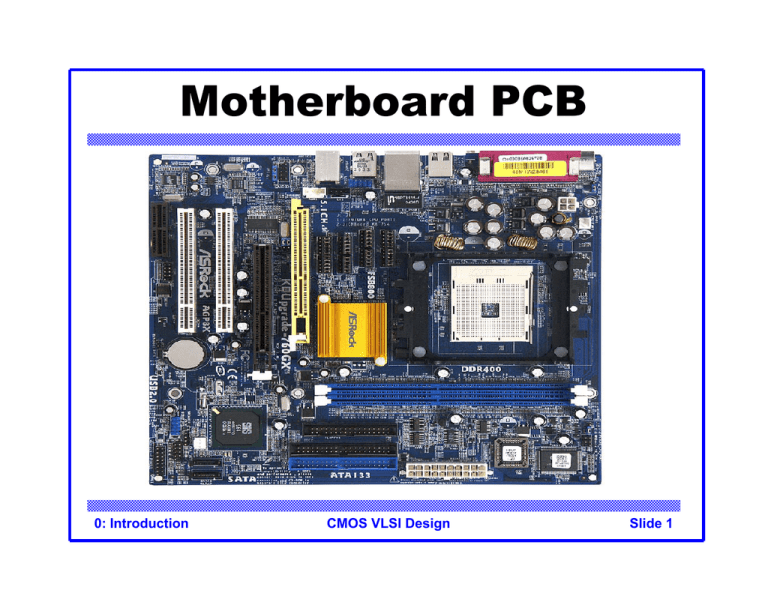
Motherboard PCB 0: Introduction CMOS VLSI Design Slide 1 Surface Mount PCB 0: Introduction CMOS VLSI Design Slide 2 Surface Mount Package 0: Introduction CMOS VLSI Design Slide 3 Chip Manufacturing Wafer Single die 0: Introduction CMOS VLSI Design Slide 4 0: Introduction CMOS VLSI Design Slide 5 Inverter Mask Set Transistors and wires are defined by masks Cross-section taken along dashed line A Y GND VDD nMOS transistor pMOS transistor well tap substrate tap 0: Introduction CMOS VLSI Design Slide 6 Inverter Cross Section Substrate must be tied to GND and n-well to VDD Metal to lightly-doped semiconductor forms poor connection called Shottky Diode Use heavily doped well and substrate contacts / taps A GND VDD Y p+ n+ p+ n+ n+ n well p substrate substrate tap 0: Introduction p+ well tap CMOS VLSI Design Slide 7 Detailed Mask Views Six masks – n-well – Polysilicon – n+ diffusion – p+ diffusion – Contact – Metal n well Polysilicon n+ Diffusion p+ Diffusion Contact Metal 0: Introduction CMOS VLSI Design Slide 8 Layout Chips are specified with set of masks Minimum dimensions of masks determine transistor size (and hence speed, cost, and power) Feature size f = distance between source and drain – Set by minimum width of polysilicon Feature size improves 30% every 3 years or so Normalize for feature size when describing design rules Express rules in terms of λ = f/2 – E.g. λ = 0.3 µm in 0.6 µm process 0: Introduction CMOS VLSI Design Slide 9 Simplified Design Rules Conservative rules to get you started 0: Introduction CMOS VLSI Design Slide 10 Inverter Layout Transistor dimensions specified as Width / Length – Minimum size is 4λ / 2λ, sometimes called 1 unit – In f = 0.6 µm process, this is 1.2 µm wide, 0.6 µm long 0: Introduction CMOS VLSI Design Slide 11 Inverter (2nd example) 0: Introduction CMOS VLSI Design Slide 12 Example: NAND3 Horizontal N-diffusion and p-diffusion strips Vertical polysilicon gates Metal1 VDD rail at top Metal1 GND rail at bottom 32 λ by 40 λ 0: Introduction CMOS VLSI Design Slide 13 Stick Diagrams Stick diagrams help plan layout quickly – Need not be to scale – Draw with color pencils or dry-erase markers 0: Introduction CMOS VLSI Design Slide 14 Wiring Tracks A wiring track is the space required for a wire – 4 λ width, 4 λ spacing from neighbor = 8 λ pitch Transistors also consume one wiring track 0: Introduction CMOS VLSI Design Slide 15 Well spacing Wells must surround transistors by 6 λ – Implies 12 λ between opposite transistor flavors – Leaves room for one wire track 0: Introduction CMOS VLSI Design Slide 16 Example: O3AI Sketch a stick diagram for O3AI – Y = ( A + B + C )D 0: Introduction CMOS VLSI Design Slide 17
